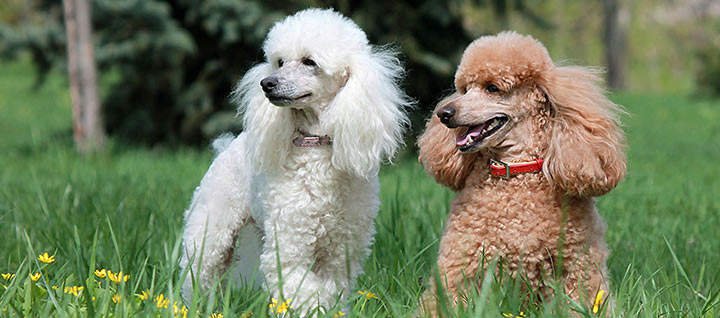When it comes to hypoallergenic dogs, poodles often top the list. But are poodles really 100% hypoallergenic? The truth may surprise you.
Poodles are known for their curly, non-shedding coat, which makes them a popular choice for individuals with allergies. However, it’s important to note that no dog breed is completely hypoallergenic. While poodles may produce fewer allergens than other breeds, individuals with severe allergies may still experience symptoms around these dogs. It’s always recommended for people with allergies to spend time with a poodle before making a decision to ensure they don’t experience any adverse reactions.
While no dog breed can be guaranteed to be 100% hypoallergenic, poodles are considered one of the most hypoallergenic breeds. This is because poodles have hair rather than fur, which minimizes shedding and reduces the amount of allergens in the environment. Additionally, their curly coat helps to trap dander, further reducing allergens. However, it’s important to note that individual allergies vary, so it’s always advisable to spend time with a poodle before making a decision.

The Myth of Poodles Being 100% Hypoallergenic
Poodles are often touted as being hypoallergenic dogs, meaning that they don’t cause allergies in people who are sensitive to pet dander. However, it is a common misconception that poodles are 100% hypoallergenic. While they may be a better choice for allergy sufferers compared to other dog breeds, there is no such thing as a completely hypoallergenic dog.
So, are poodles hypoallergenic? The answer is a bit complicated. While poodles have hair instead of fur, which reduces the amount of shedding and dander they produce, they still produce allergens that can trigger allergies in sensitive individuals. Let’s explore this topic further to understand what hypoallergenic really means and what you need to consider if you have allergies but are considering getting a poodle.
Understanding Hypoallergenic Dogs
To understand why poodles are considered hypoallergenic, it’s important to first understand what causes allergies in people. Most pet allergies are caused by a protein found in the urine, saliva, and dander (dead skin cells) of animals. These allergens can become airborne and easily inhaled, causing an allergic reaction in sensitive individuals.
Hypoallergenic dogs, including poodles, are breeds that produce fewer allergens compared to other breeds. This is because their hair grows continuously and is more similar to human hair, which means it is less likely to shed and release dander into the environment. Additionally, hypoallergenic dogs tend to have less oil on their skin, reducing the amount of allergens present.
However, it’s important to note that no dog is completely hypoallergenic. Even hypoallergenic breeds like poodles can still produce allergens, albeit in smaller quantities. Therefore, individuals with severe allergies may still have allergic reactions to poodles, although the symptoms may be milder compared to other breeds.
Factors Affecting Allergenicity in Poodles
While poodles are generally considered hypoallergenic, several factors can influence their level of allergenicity:
1. Individual Sensitivities
Every person’s allergies and sensitivities are unique. While one individual may not have any reactions to poodles, another may experience symptoms even in their presence. It’s important to spend time with poodles before making a decision to see how your body reacts to them.
2. Allergen Accumulation
Poodles, like all dogs, can still produce allergens, such as dander and saliva. These allergens can accumulate on surfaces in your home, such as furniture and carpets. Regular cleaning and maintenance can help minimize the presence of allergens in your living space.
3. Grooming and Bathing
Regular grooming and bathing of your poodle can help reduce the number of allergens present on their coat. This is because grooming helps to remove loose hair and dander, while bathing helps to wash away allergens from the skin and hair.
Benefits of Poodles for Allergy Sufferers
While poodles may not be 100% hypoallergenic, they do have several advantages for individuals with allergies:
- Poodles shed minimally, which means there is less loose hair and dander in the environment.
- They have curly or wavy hair, which helps to trap and hold onto loose hair and dander, reducing their spread in the environment.
- Poodles produce less oil on their skin, which can help reduce the amount of allergens present.
Conclusion
Poodles are often considered hypoallergenic dogs, but it’s important to understand that no dog breed is completely hypoallergenic. While poodles may produce fewer allergens compared to other breeds, they can still trigger allergic reactions in sensitive individuals. If you have allergies, it’s recommended to spend time with poodles before making a decision to see how your body reacts to them. Regular grooming and cleaning can also help minimize the presence of allergens in your living space. Consult with your allergist or healthcare professional for personalized advice and guidance.
Key Takeaways: Are Poodles 100% Hypoallergenic?
- Poodles are often considered hypoallergenic, but no dog breed is completely hypoallergenic.
- They have hair instead of fur, which reduces shedding and dander in the environment.
- Poodles produce less allergenic proteins called allergens, making them a better choice for people with allergies.
- Regular grooming and cleaning can further reduce allergens in poodles.
- Individual allergies can vary, so it’s important to spend time with a poodle before committing to ownership.
Frequently Asked Questions
Here are some common questions about poodles and their hypoallergenic qualities.
1. Are poodles completely hypoallergenic?
While poodles are often touted as hypoallergenic, it is important to note that no dog breed is truly 100% hypoallergenic. However, poodles, particularly the standard and miniature varieties, are known to be more hypoallergenic compared to other breeds. Their curly, non-shedding coats help reduce the amount of dander, which is a common allergen for people with allergies.
If you suffer from allergies but still want to have a dog, poodles are a great option as they are less likely to trigger allergic reactions. It is still recommended that you spend time with a poodle before bringing one into your home to ensure that you don’t have a severe reaction.
2. Do all poodle sizes have the same hypoallergenic qualities?
All sizes of poodles, including standard, miniature, and toy, have similar hypoallergenic qualities. However, larger poodles may produce more dander compared to their smaller counterparts due to their larger size. It is important to note that individual allergies may vary, so it is always recommended to spend time with different sizes of poodles to see which one best suits your allergy needs.
If you have severe allergies, it may be beneficial to spend time with a standard poodle before considering a miniature or toy poodle.
3. How should I groom a poodle to minimize allergens?
Regular grooming is essential for reducing allergens in a poodle’s coat. This includes bathing them regularly with hypoallergenic dog shampoos to remove any potential allergens that may be trapped in their fur. Additionally, brushing their coat frequently helps remove loose hair and dander that could trigger allergies.
Trimming their hair short can also help minimize the accumulation of allergens. If you have severe allergies, it may be beneficial to have a professional groomer take care of grooming to ensure thorough cleaning and reduce the risk of allergic reactions.
4. Can poodles still cause allergies in some people?
Although poodles are generally considered hypoallergenic, it is still possible for some individuals to experience allergies or allergic reactions. Allergies vary from person to person, and some people may be more sensitive to certain proteins or allergens present in poodle dander or saliva.
If you have severe allergies, it is always recommended to spend time with a poodle before bringing one into your home to see if you have any allergic reactions. Consulting with an allergist or physician is also advisable, as they can provide guidance based on your specific allergies and sensitivities.
5. Are poodles suitable for individuals with asthma?
Poodles are often recommended as a good choice for individuals with asthma, as they are known to produce less dander compared to many other dog breeds. However, it is important to note that asthma triggers vary from person to person, and while poodles may be less triggering for some individuals, others may still experience asthma symptoms in their presence.
If you have asthma, it is best to spend time with a poodle to assess your personal sensitivity before deciding to bring one into your home. Consulting with your healthcare provider is also important to ensure that adding a poodle to your household is a safe choice for your asthma management.

Are Poodles Hypoallergenic? Tips for Families with Allergies.
In summary, while poodles are often marketed as hypoallergenic, there is no such thing as a completely hypoallergenic dog. Poodles have hair instead of fur, which reduces the amount of shedding and dander, but they still produce allergens that can trigger allergies in sensitive individuals.
It’s important to note that individual reactions to allergens can vary, and some people with allergies may be able to tolerate poodles better than other breeds. However, it’s always recommended to spend time with a poodle and assess your own sensitivity before bringing one into your home.
